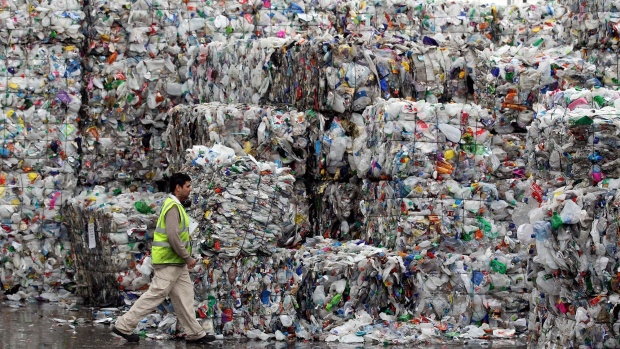Nov 30, 2022
EU Targets Big Plastic With Rules to Cut Packaging Waste
, Bloomberg News

(Bloomberg) -- The European Union is targeting coffee pods, hotel toiletries and throwaway water bottles with a set of proposals meaning to save space at landfills and reduce carbon-dioxide emissions.
The measures released Wednesday by the European Commission seek to decrease packaging waste 5% from 2018 levels by the end of this decade and 15% by the end of next. All packaging products would have to be recyclable, and items such as teabags and apple stickers would have to be compostable.
“If we don’t change current trends, the volume of plastic waste could increase by 46% by 2030,” said Virginijus Sinkevicius, EU environment commissioner.
Five percent may seem small, but the amount of waste -- and corresponding emissions -- is surging as e-commerce becomes more prevalent and companies search for innovative ways to sell their products. The effort could have knock-on effects globally, given the EU is the largest single market.
“It’s world-leading,” said Piotr Barczak, senior policy officer for circular economy and waste at the European Environmental Bureau, a coalition of citizens’ organizations. “The fastest-increasing stream of waste is packaging waste.”
The rules would have ramifications for industries ranging from food production to consumer electronics to chemical manufacturing. In the EU, about 40% of plastic and half of paper is used in packaging, and the design often makes reuse or recycling difficult.
Certain sectors -- such as the beer industry -- will face targets for reusing packaging, according to the regulations. That could lead to bottle shapes being more uniform.
Companies from Nestle SA to Carlsberg AS broadly welcomed the proposals and said that they were already undertaking efforts to reduce waste. Brewers of Europe, a trade body for the beer industry, said that they wanted to see proportionate regulation and one that isn’t discriminatory to a particular sector.
The proposals likely will face some opposition from the packaging industry and its customers, who may have to pay more to set up recycling systems or find alternative materials.
The European Organisation for Packaging and the Environment said any mandates must include incentives for investing in the required infrastructure.
Under the measures, countries would have to set up systems for recycling bottles and cans in which consumers pay extra for the item upfront and then get that money back when it’s returned. The goal is for a 90% collection rate. If states can prove they’ve hit that goal through other means, they could be exempted from the new measures.
(Adds company responses in eighth paragraph.)
©2022 Bloomberg L.P.





